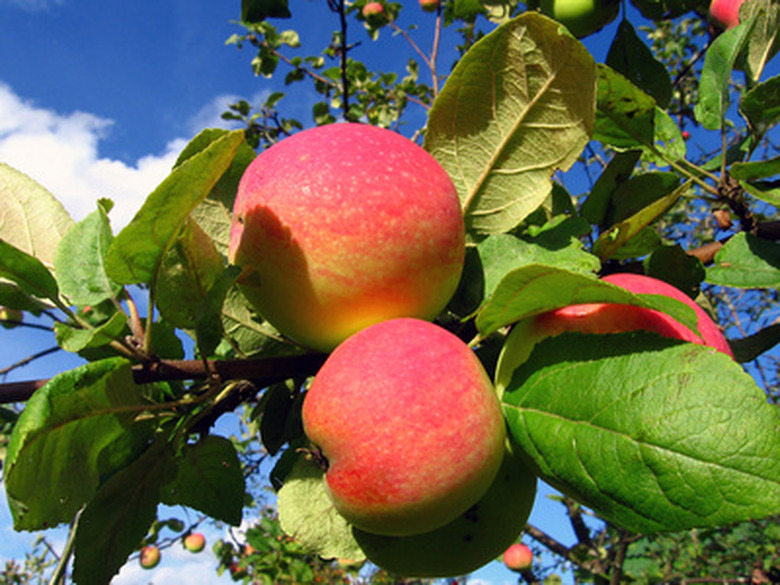The Best Fruit Trees For Foothills, North Carolina
Western North Carolina, which home to the Appalachian Mountains, is also known as the "Foothills" area and includes the tourist-destination of Asheville. The area is located in USDA Zone 7, where winter temperatures can drop to 0 degrees Fahrenheit. This area is good for growing fruit trees, and apples are a key crop throughout the state. Fruits that require a certain number of chill hours (temperatures below 45 degrees), perform well in the Foothills. Home gardeners should select fruit trees that can survive late frost, or flower late, as the weather can be inconsistent.
Apples
Many apple trees grow well in the Foothills area, though early varieties should be avoided due to the risk of frost damage. Braeburn, Fuji and Rome varieties are all late producers and should be safe from freezing. Braeburns and Fujis, which are found in nearly every grocery store in the U.S., are both medium-sized, firm, sweet fruits, though Braeburn is a bit tart. Rome is a larger apple with bright red skin, and is considered better for baking and canning than eating. Apple trees require between 900 to 1,200 hours of chill time and produce fruit from July to early November, depending on the variety. Braeburns, Fujis and Romes should be ready for harvest in western North Carolina in the late fall. Trees should be planted in full sun and require regular water as fruit develops.
- Western North Carolina, which home to the Appalachian Mountains, is also known as the "Foothills" area and includes the tourist-destination of Asheville.
- Many apple trees grow well in the Foothills area, though early varieties should be avoided due to the risk of frost damage.
Pears
Common pears (Pyrus communis) can thrive in the Foothills area of North Carolina, as they need a minimum of 600 chill hours, and preferably up to 900. Trees may be protected from late frost by planting on a down slope or close to a dwelling. Most pears found in grocery stores are "European" pears, which include the Anjou, Barlett and Bosc varieties. Anjou is a late-season variety and needs less protection than either Bartlett or Bosc, which may flower before the last frost in the Appalachians. Pear trees, which are susceptible to fireblight, should be planted in full sun and require regular water.
Plums
Both the European (Prunus domestica) and Japanese (P. salicina) varieties of plum trees can do well in North Carolina Foothills, as the European varieties require up to 900 hours of chill time and the Japanese varieties require up to 500. Japanese varieties will grow better in the valleys, while European varieties can do well at higher elevations. Damson is a late-producing European variety that should flower after the last frost, while Ozark Premier is a Japanese variety that has sweet flavor and should ripen in July or August. Plum trees should be planted in full sun and require regular soakings to keep the roots moist. Because rainfall is inconsistent in the Foothills, gardeners should be particularly attentive to soil moistness of young trees.
- Common pears (Pyrus communis) can thrive in the Foothills area of North Carolina, as they need a minimum of 600 chill hours, and preferably up to 900.
- Anjou is a late-season variety and needs less protection than either Bartlett or Bosc, which may flower before the last frost in the Appalachians.
References
- Rain Tree Nursery: Chill Time Chart
- North Carolina State University: Growing Pears in North Carolina
- "Sunset National Garden Book"; the editors of Sunset Books and Sunset Magazine; 1997
